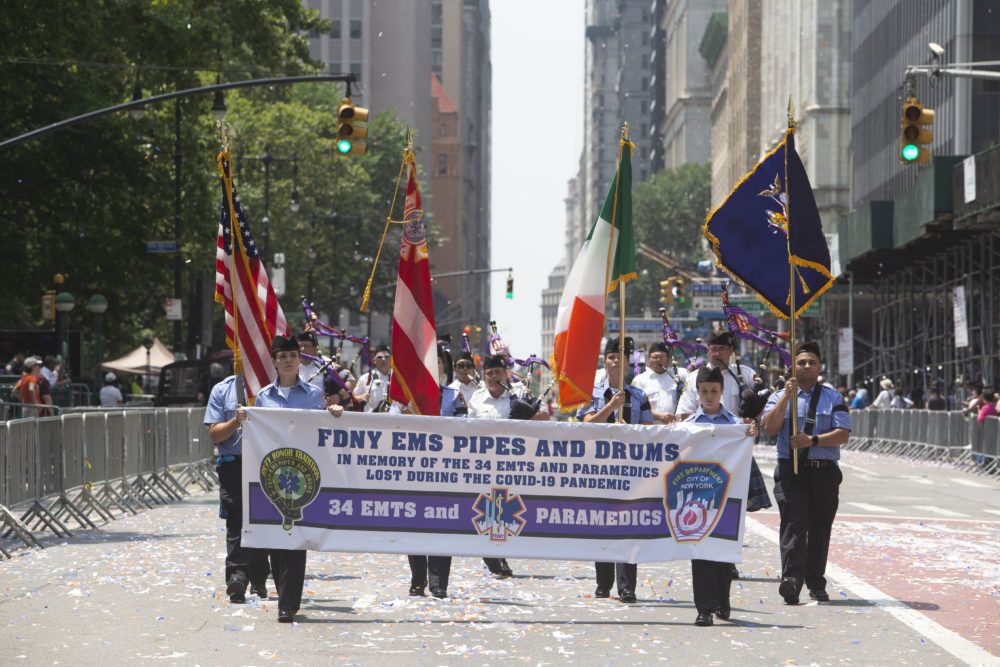A ticker-tape, New York City parade celebrated youth probation officers, along with workers from nonprofit agencies, transit and other institutions deemed essential workplaces during the pandemic. (Photos: Clarissa Sosin)
During the rollercoaster ride of a pandemic, it was Maxene Foster’s job to help make sure that cash-strapped Bronx residents got fed, were safely sheltered and so forth. For those efforts, the 20-year employee of Bronxworks, was tapped to represent the 900 staffers of that nonprofit agency during that rarest of Big Apple events: a ticker-tape parade.
“I'm one of the staff who was in every day from, maybe, the ending of May last year. I've been in the office every day,” said Foster, standing in the blistering sun as that parade prepared to step off in Lower Manhattan.
Foster is program coordinator for Bronxworks, which typically helps low-income families access housing, food, finances and other everyday essentials. During COVID-19’s shutdown of many parts of the local economy, lately, newly jobless middle-income families also asked for help.
For that celebratory parade, Foster was shoulder-to-shoulder with workers from hospitals, restaurants, schools, public transit and an array of essential institutions who paraded down blocked-off streets. Confetti fell. Onlookers on sidewalks and from construction site scaffolding applauded, cheered and recorded the goings-on on their smartphones.
“It’s a big gesture,” said New York City Probation Commissioner Ana Bermúdez, one of the marchers.
Among the national and local officials turning out to mingle, congratulate and thank the honorees were Congressman Charles Schumer, New York City Mayor Bill de Blasio and Eric Adams, a former police officer just elected as the Democratic nominee in the race to succeed de Blasio.
Special programs kept young parolees engaged during 2020 shutdown
 Bermúdez praised her own department’s parole officers and other staffers for providing youth in the juvenile justice system laptops and tablets so they could connect to online learning; for doing at-home wellness checks on kids they couldn’t reach over the phone; for showing up with pizza and working in various other ways to keep those youth engaged and on the right path.
Bermúdez praised her own department’s parole officers and other staffers for providing youth in the juvenile justice system laptops and tablets so they could connect to online learning; for doing at-home wellness checks on kids they couldn’t reach over the phone; for showing up with pizza and working in various other ways to keep those youth engaged and on the right path.
Bermúdez reflected on the past 16 months. As the pandemic surged and summer youth jobs programs were canceled, many young people endured both a loss of needed income but also uncertainty over how to spend hours they’d hoped to be working.
“It is actually not a cliche” she said, “that keeping young people busy, and moving and going places and doing things, really diverts them from that kind of festering of other things that, then, lead them to violence or what have you.”
To keep 2,700 youth and young adults on probation from being isolated and idle — amid last year’s street protests against police brutality and racial injustice — the probation department launched NeON Summer 2020. Its 14- to 24-year-old participants wrote poetry, shot photography, sharpened their culinary and theater skills and, by other means, reflected on their own lives, disappointments and strides. For being in that six-week, online program, they received a $1,200 stipend.
City Councilman Brad Lander, newly elected Democratic nominee for city comptroller, had greeted Bermúdez with a hug and thanked the commissioner and her crew for serving their young charges during the pandemic. The two leaders discussed the importance of supportive outreach to youth, rather than merely enforcing truancy rules and other aspects of their parole at a time like this. Across the country, some juvenile justice systems across the country are pondering which reforms might better aid in putting justice-involved youth on the right track.
“If it’s all conflict,” Lander said, “then, there’s no progress.”
Clarissa Sossin contributed to this report

